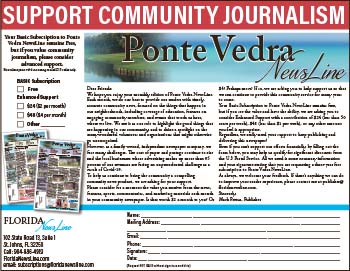By Susan D. Brandenburg
mail@floridanewsline.com
A nationally known journalist, St. Johns County resident Glenn Guzzo has written thousands of articles, authored three books and worked as an editor for such publications as The Denver Post, Akron Beacon Journal, Philadelphia Inquirer and the Fort Worth Star Telegram. Guzzo, who earned his bachelor of arts in journalism at Wayne State University in Detroit, began his storied career at 17 as a reporter for the Dearborn (Mich.) Times-Herald and by age 21, had worked his way up to the position of editor. Under Guzzo’s leadership, both the Akron Beacon Journal and the Philadelphia Inquirer won Pulitzer Prizes and while working with Knight-Ridder Inc., Guzzo was involved in a partnership with CNN for a national town hall meeting hosted by Larry King.
Since moving to St. Johns County in 2003 with his wife and daughter, Guzzo has taught journalism classes at the University of North Florida, done consultant work for Strat-O-Matic Media LLC and appeared as an expert witness (libel and defamation) in cases on behalf of the New York Times, Philadelphia Daily News and others. Well-traveled, knowledgeable and highly respected as a member of the American Society of Newspaper Editors, Guzzo has been actively involved in the Jacksonville Sports Council since 2004 and now considers North Florida, particularly South Ponte Vedra Beach, to be “the ideal place to live.”
1. As suburban editor for the Philadelphia Inquirer, you created the highly successful Neighbors Sections, and now you are being interviewed by a neighborhood publication. Why do you think a community newspaper is important?
Neighborhood newspapers are close to their audience. I think the national/metro newspapers would be more influential if they really got out into the community to understand the mood of the readers. Shining a light on a community problem, explaining a difficulty someone has overcome, a career accomplishment, encouraging initiative in reporting – this, in turn, leads to good coverage of local issues that should be reported on all year round.
2. When you were teaching beginning journalism classes at the University of North Florida, what were some of the key lessons you imparted to your students?
The first lesson is that there’s a big difference between writing for a teacher (an audience of one who knows more than you do about the subject and is paid to read to the end) and a mass audience (a bunch of strangers who don’t know the subject as well as you do and who owe you no loyalty). If you don’t seize the attention of the mass audience immediately, you lose it. Communicate what is most urgent and compelling – and do it in a clear, accurate manner. People have to understand the subject matter or their eyes glaze over. Clarity is paramount.
3. Is there one news story that particularly stands out for you?
A couple of years ago, a Times-Union reporter, Eileen Kelley, was new in town and sought my guidance when she was asked to dig into the police and fire pension debt … a very difficult subject since pension laws and vast amounts of money aren’t things people understand. I helped her do some work she was proud of – work that helped the community understand what is at stake.
4. What brought you to St. Johns County?
I was a journalism vagabond, moving from state to state during my newspaper career. When I decided to write books and work for myself as a consultant, my wife, Donna (now with RSVP in St. Johns County), expressed the desire to be closer to her family in South Florida. We looked around the state and this was the place we loved the best. It’s vibrant and growing and it has been a great place to raise our daughter, Scheherazade “Scher” who was six years old when we moved here. Yes, she’s named after the famous story teller of the 1001 Arabian Nights and at age 19, she’s a wonderful writer; however, she’s not following in my footsteps. She’s her own person — an actress who is earning a four-year degree in entertainment business at Full Sail University in just 20 months.
5. As an accomplished journalist, what question is asked of you most frequently?
I get asked by a lot of young people whether, with the decline of newspaper circulation, I would still go into a journalism career. All I can tell people is that there has never been a better time to do what you love. You spend the majority of your waking hours at work – I can’t imagine not loving what I was doing. It’s hard work, and satisfying. Things change all the time. You meet interesting people from all walks of life, from heads of state to owners of professional sports teams. Every year is fascinating.
Photo courtesy Glenn Guzzo
Glenn Guzzo







